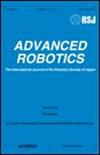Trajectory tracking of robot manipulator with adaptive fuzzy second-order super-twisting sliding mode control
IF 2
4区 计算机科学
Q4 ROBOTICS
引用次数: 0
Abstract
AbstractTo solve the influence of uncertainties such as unmodeled errors and external disturbances on the trajectory tracking accuracy of the end-effector of a robot manipulator, a novel fuzzy super-twisting second-order sliding mode control method is proposed in this paper. Based on the dynamic model of the robot manipulator, a second-order sliding mode control algorithm is proposed by using the super-twisting to determine the non-singular terminal sliding manifold. An adaptive fuzzy algorithm is presented to compensate for the super-twisting second-order sliding mode control system for handling the chattering and overestimating the controller gains. The stability of the proposed controller is verified by the Lyapunov stability theory. Simulation and experimental results show that the proposed control method can enable the robot to track the trajectory accurately under complex and uncertain conditions and effectively suppress the chattering phenomenon of the system.Keywords: Robot manipulatortrajectory trackingadaptive fuzzy super-twisting algorithmsecond-order sliding mode control Disclosure statementNo potential conflict of interest was reported by the author(s).Additional informationFundingThe author would like to express his gratitude for the support of the University Scientific Research Project of Education Bureau of Guangzhou Municipality under Grant 202032821 and the Guangzhou City School Joint Project under Grant SL2023A03J00681.Notes on contributorsDachang ZhuDachang Zhu received the B.S. degree in mechanics design and the M.S. degree in theoretical mechanics from the Jiangxi University of Technology and Science, Ganzhou, China, in 1996 and 1999, respectively, the Ph.D. degree in mechanical engineering from Beijing Jiaotong University, Beijing, China, in 2008, and the Postdoctor in mechanical engineering from the South China University of Technology, Guangzhou, China, in 2012. He currently works as full professor with the School of Mechanical and Electrical Engineering, Guangzhou University, Guangzhou, China. His research interests include topology optimization theory and applications in compliant mechanisms, robotics, and feedback control of the dynamic systems.Puchen ZhuPuchen Zhu received his Bachelor's degree in Engineering from Guangdong University of Technology, Guangzhou, China. he is currently a Master of Philosophy student at the Mechanical and Automation Engineering department at the Chinese University of HongKong (CUHK). his research interests include Robotics, Medical Robotics, and Robotic Modeling and Control.Yonglong HeYonglong He is a student pursuing a master's degress in Mechanical Engineering from the School of Mechanical and Electrical Engineering, Guangzhou University, Guangzhou, China. his research interests include Robotics, Compliant mechanism.基于自适应模糊二阶超扭滑模控制的机械臂轨迹跟踪
摘要为解决未建模误差和外部干扰等不确定性对机器人末端执行器轨迹跟踪精度的影响,提出了一种新的模糊超扭转二阶滑模控制方法。基于机器人的动力学模型,提出了一种利用超扭转来确定非奇异末端滑动流形的二阶滑模控制算法。提出了一种自适应模糊算法来补偿超扭转二阶滑模控制系统对抖振的处理和控制器增益的高估。利用李雅普诺夫稳定性理论验证了所提控制器的稳定性。仿真和实验结果表明,所提出的控制方法能够使机器人在复杂和不确定的条件下准确地跟踪轨迹,有效地抑制了系统的抖振现象。关键词:机器人操纵器轨迹跟踪自适应模糊超扭转算法二阶滑模控制披露声明作者未报告潜在利益冲突。作者感谢广州市教育局高校科研项目(资助项目:202032821)和广州市学校联合项目(资助项目:SL2023A03J00681)的支持。朱昌璋:朱昌璋分别于1996年和1999年获得江西理工大学力学设计专业学士学位和理论力学专业硕士学位,2008年获得北京交通大学机械工程专业博士学位,2012年获得华南理工大学机械工程专业博士后学位。他目前是广州大学机电工程学院的正教授。他的研究兴趣包括拓扑优化理论及其在柔性机构、机器人和动态系统反馈控制中的应用。Puchen Zhu,毕业于中国广州广东工业大学,获工学学士学位。现为香港中文大学机械及自动化工程系哲学硕士研究生。主要研究方向为机器人、医疗机器人、机器人建模与控制。何永龙,中国广州大学机电工程学院机械工程专业硕士研究生。主要研究方向为机器人、柔性机构。
本文章由计算机程序翻译,如有差异,请以英文原文为准。
求助全文
约1分钟内获得全文
求助全文
来源期刊

Advanced Robotics
工程技术-机器人学
CiteScore
4.10
自引率
20.00%
发文量
102
审稿时长
5.3 months
期刊介绍:
Advanced Robotics (AR) is the international journal of the Robotics Society of Japan and has a history of more than twenty years. It is an interdisciplinary journal which integrates publication of all aspects of research on robotics science and technology. Advanced Robotics publishes original research papers and survey papers from all over the world. Issues contain papers on analysis, theory, design, development, implementation and use of robots and robot technology. The journal covers both fundamental robotics and robotics related to applied fields such as service robotics, field robotics, medical robotics, rescue robotics, space robotics, underwater robotics, agriculture robotics, industrial robotics, and robots in emerging fields. It also covers aspects of social and managerial analysis and policy regarding robots.
Advanced Robotics (AR) is an international, ranked, peer-reviewed journal which publishes original research contributions to scientific knowledge.
All manuscript submissions are subject to initial appraisal by the Editor, and, if found suitable for further consideration, to peer review by independent, anonymous expert referees.
 求助内容:
求助内容: 应助结果提醒方式:
应助结果提醒方式:


